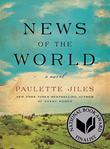It’s hard to believe that in the course of Tom Hanks’ long career he’s never done a Western. He’s remedied this by co-producing and starring in News of the World, a new film adaptation of Paulette Jiles’ Kirkus-starred 2016 novel, which premieres in theaters on Dec. 25. Despite Hanks’ best efforts, however, he never manages to bring this laid-back genre entry to life.
The book, which was a National Book Award finalist, is a fairly low-key affair that wouldn’t seem like an obvious candidate for a Hollywood movie—unless its star was on the hunt for an Oscar. The setup is simplicity itself: It’s 1870, and 71-year-old military veteran Capt. Jefferson Kyle Kidd makes a living by traveling from town to town in a generally lawless West, giving public readings from various newspapers. His audience members have little access to news from the outside world, and they’re willing to hand over their dimes for the opportunity to hear it in Capt. Kidd’s sonorous voice. At one stop, however, he’s asked to transport a 10-year-old girl, Johanna Leonberger, to family members outside San Antonio, Texas, 400 miles away. Her mother, father, and sister—German immigrant settlers—were all killed by Kiowa warriors years before; she lived as part of a Kiowa family until government troops reclaimed her. She seems to have little memory of her biological family; she considers herself Kiowa and speaks very little English. Capt. Kidd takes on the task of seeing her to her kin. During the journey, he and the girl forge a bond, but they encounter a few dangers along the way—including, most notably, a vile group of human traffickers who seek to kidnap Johanna.
 The book was named one of Kirkus’ Best Books of 2016, and our reviewer notes that it “succeeds in skirting clichés through its empathy and through the depth of its major characters.” Jiles, in warm, companionable prose, paints detailed portraits of Kidd and Johanna, which makes their long journey a pleasant one to follow. That said, they don’t find themselves in many dramatic situations, aside from a single, riveting shootout; it’s not that kind of Western. At one point, the pair confront a group of publicity-hungry outlaws who want Capt. Kidd to sing their praises at an upcoming reading; he avoids this by simply not showing up, and it’s all played for laughs. In the film, this same encounter leads to a protracted abduction in which the gang forces Capt. Kidd to perform onstage; improbably, he manages to convince an audience to turn against his enemies in just a few minutes—using nothing but the power of storytelling.
The book was named one of Kirkus’ Best Books of 2016, and our reviewer notes that it “succeeds in skirting clichés through its empathy and through the depth of its major characters.” Jiles, in warm, companionable prose, paints detailed portraits of Kidd and Johanna, which makes their long journey a pleasant one to follow. That said, they don’t find themselves in many dramatic situations, aside from a single, riveting shootout; it’s not that kind of Western. At one point, the pair confront a group of publicity-hungry outlaws who want Capt. Kidd to sing their praises at an upcoming reading; he avoids this by simply not showing up, and it’s all played for laughs. In the film, this same encounter leads to a protracted abduction in which the gang forces Capt. Kidd to perform onstage; improbably, he manages to convince an audience to turn against his enemies in just a few minutes—using nothing but the power of storytelling.
It’s not the only time that director Paul Greengrass and co-screenwriter Luke Davies add scenes in an attempt to amp up the source material, but here they all feel clumsy and contrived. At another point, Capt. Kidd and Johanna are consumed by a frightening sandstorm—which they get through with no ill effects whatsoever. In another scene, the captain gives a can’t-we-all-get-along speech to unruly audience members that seems tailor-made for an awards-show clip.
Indeed, although Hanks has won two Academy Awards in the past (for1993’s Philadelphia and 1994’s Forrest Gump), it’s hard to see this movie as anything but another shot at the title. German child actor Helena Zengel, who plays Johanna, does her best with a difficult part, but the film’s creators don’t seem all that interested in her. This is Hanks’ show, and the camera lingers on his bewhiskered face for quite a large portion of it. In scene after scene, he shows emotion in the limited, laconic way that American Westerns allow leading men to do, and it’s easy to imagine another actor—say, Kevin Costner—hitting the same bland beats in the same bland way. Without a compelling central performance, audiences are left to watch the scenery go by as Capt. Kidd and Johanna travel down dirt roads and through grimy frontier towns. Fortunately, like the captain himself, audiences can take comfort in the written word and simply read Jiles’ book, instead.
David Rapp is the senior Indie editor.



































